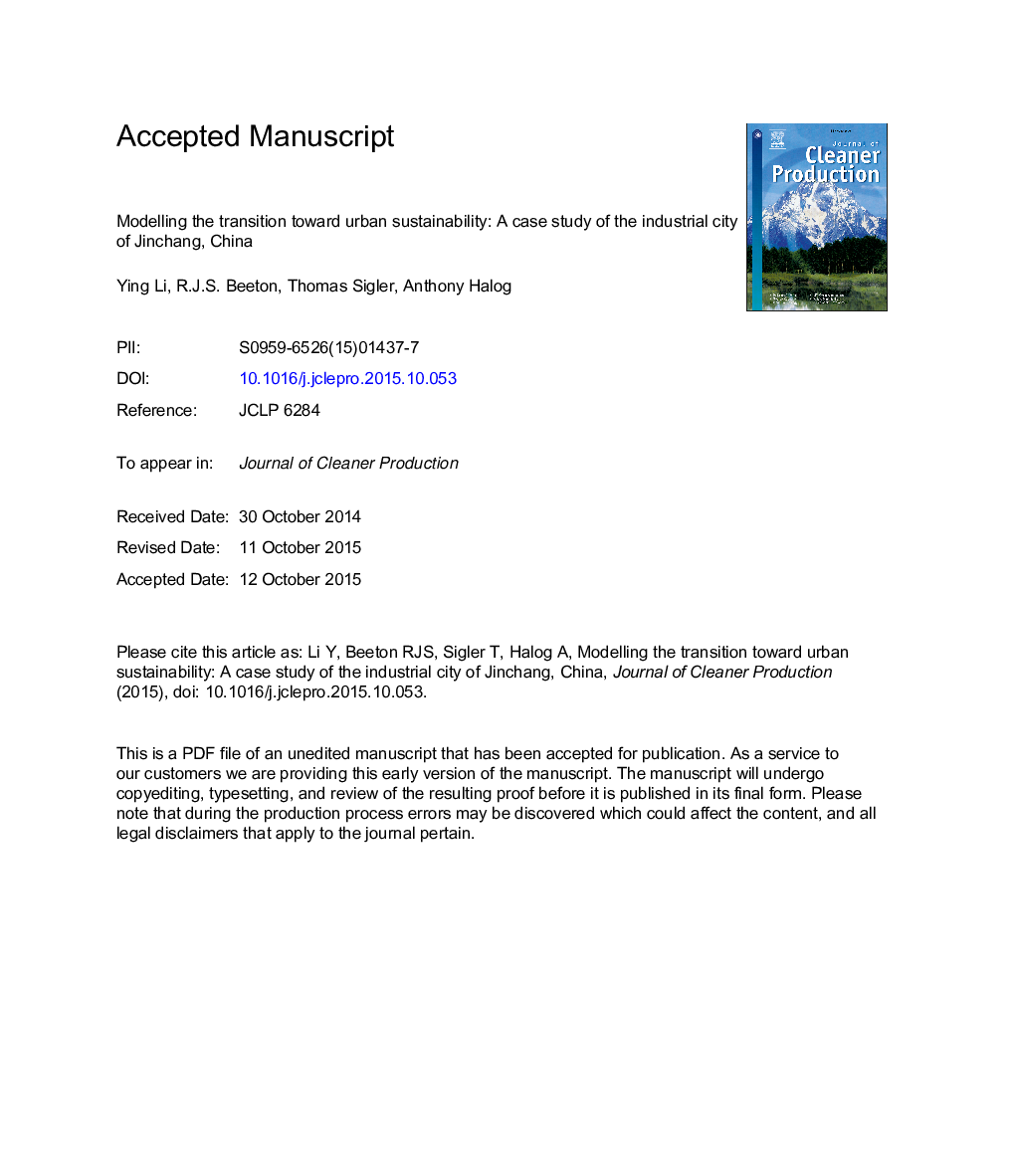| کد مقاله | کد نشریه | سال انتشار | مقاله انگلیسی | نسخه تمام متن |
|---|---|---|---|---|
| 10687768 | 1017948 | 2016 | 20 صفحه PDF | دانلود رایگان |
عنوان انگلیسی مقاله ISI
Modelling the transition toward urban sustainability: a case study of the industrial city of Jinchang, China
ترجمه فارسی عنوان
مدل سازی گذار به پایداری شهری: مطالعه موردی شهر صنعتی جینچانگ، چین
دانلود مقاله + سفارش ترجمه
دانلود مقاله ISI انگلیسی
رایگان برای ایرانیان
کلمات کلیدی
پایداری شهری، انتقال شهری، شهرهای صنعتی، جریان مواد تولید تمیزکننده، پاسخ انسانی،
ترجمه چکیده
توسعه پایدار شهری یک گفتمان اساسی برای شهرهای در کشورهای صنعتی است. این به خصوص برای شهرهای صنعتی صنعتی در کشورهای در حال توسعه سریع است که در آن ساکنان محلی و سیستم های زیست محیطی به واسطه رشد اقتصادی به طور قابل توجهی تحت تاثیر قرار گرفته اند. در این مقاله، ما در مورد شهر جینچانگ (شمال غربی چین) به منظور نشان دادن چگونگی درک و تسهیل گذار به پایداری شهری می پردازیم. با استفاده از مدل متابولیسم شهری همراه با تحقیقات اجتماعی کیفی و تجزیه و تحلیل سیاست برای درک سیستم های شهری، این تحقیق تایید می کند که پایداری شهری نیاز به مدیریت، سیاست و برنامه ریزی خوب، و همچنین مشارکت شرکت های محلی و ساکنان دارد. این می تواند بر اساس مفهوم متابولیسم شهری ساخته شود که تغییرات را شناسایی کرده و پاسخ های سازگار را نشان می دهد که در هنگام ترکیب با فهم عمومی می تواند تغییرات سازنده ای در ابعاد فیزیکی، اقتصادی و اجتماعی شهر ایجاد کند. به طور خاص، چنین تغییری بر توسعه سریع سرمایه انسانی مناسب می باشد که می تواند برای نظارت و ارزیابی عملکرد سیستم های شهری، تسهیل نوآوری و ایجاد یک اقتصاد متنوع باشد. شهرهای با سرعت در حال رشد در شمال غربی چین مدلی از چگونگی ایجاد شهرهای جدید صنعتی را در جریان گذار به پایداری جهانی ارائه می دهند. به طور خاص این تحقیق نشان می دهد که چگونه می توان از بهبود زیست محیطی در شمال غربی چین دست بردارد و یک مدل برای جهان در حال توسعه ایجاد شود.
موضوعات مرتبط
مهندسی و علوم پایه
مهندسی انرژی
انرژی های تجدید پذیر، توسعه پایدار و محیط زیست
چکیده انگلیسی
Sustainable urban development is a fundamental discourse for cities in industrialising nations. This is particularly so for new industrial cities in rapid developing countries where local residents and ecological systems have been significantly impacted by economic growth. In this paper, we draw upon the case of Jinchang City (north-western China) to demonstrate how the transition toward urban sustainability can be understood and facilitated. By using an urban metabolism model combined with qualitative social research and policy analysis to understand the urban systems, this research verifies that urban sustainability requires good governance, policy and planning, as well as the participation of local enterprises and residents. This can be built on the notion of urban metabolism that identifies changes and suggests adaptive responses, which when combined with informed public understanding can create adaptive changes in the physical, economic and social dimensions of the city. In particular, such change is predicated upon the rapid development of appropriate human capital that can be employed to monitor and evaluate the functioning of the urban systems, facilitate innovation and build a diversified economy. The rapidly growing cities in north-western China provide a model of how new industrial cities have the potential to be significant actors in the transition toward global sustainability. Specifically this research suggests how necessary environmental improvements for north-western China can be achieved and a model for the developing world can be created.
ناشر
Database: Elsevier - ScienceDirect (ساینس دایرکت)
Journal: Journal of Cleaner Production - Volume 134, Part A, 15 October 2016, Pages 22-30
Journal: Journal of Cleaner Production - Volume 134, Part A, 15 October 2016, Pages 22-30
نویسندگان
Ying Li, R.J.S. Beeton, Thomas Sigler, Anthony Halog,
